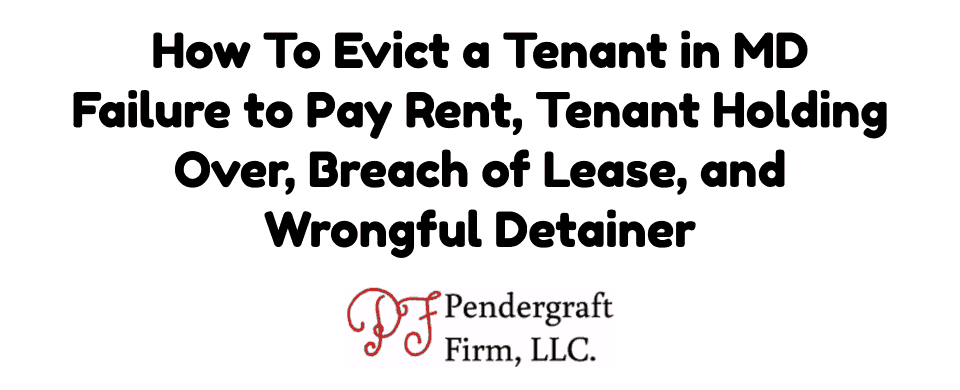There are four different complaint forms that a Landlord can file to evict a tenant in Maryland. They are failure to pay rent, tenant holding over, breach of lease, and forcible entry and detainer. The first step in learning how to evict a tenant in MD is figuring out how to choose the right cause of action. Choosing the right cause of action is half the battle. Picking the wrong one will waste your time and money.
Failure To Pay Rent
Failure to pay rent is used when a Landlord wants to evict a tenant for not paying rent. There are things a Landlord must do before he can file for failure to pay rent. Most Jurisdictions require Maryland landlords to have Rent Licenses before they can file for failure to pay rent. There are very few exceptions. Generally speaking, a person renting to an immediate family member or an absentee active duty military owner may be able to file without a license. However, in the case of the average landlord or real estate investor, this exception does not apply. A landlord must also have a written lease agreement that is signed by both parties. Otherwise, the case will be dismissed. Lastly, landlord must have a rent ledger that tracks rental payment history. With these in hand, you can file for failure to pay rent.
If a landlord does not have a license, he can apply for one and wait until he gets it to file later. If he cannot wait, then he can file for tenant holding over.
Tenant Holding Over – Oral Lease Agreements
Tenant Holding Over is my go to cause of action to evict tenants with oral lease agreements. The downside is that landlord will not be able to recover rent money, but at least they can recover possession of the property.
A landlord must give a tenant 30 to 60 days notice to vacate by first class mail to evict a tenant with an oral lease agreement depending on the jurisdiction If the tenant is still on the property after the notice expires, then the landlord can file for tenant holding over.
Tenant Holding Over – Written Lease Agreements
Tenant Holding Over can also be used to evict tenants with written lease agreements that do not leave after their lease agreement has ended. If a landlord has a good lease agreemet, he can send his tenant a notice to vacate prior to the end of the lease according to the lease terms. If tenant has not left by the end of the term, he can then file for tenant holding over.
Breach of Lease
Breach of lease can be used to evict tenants in breach of their lease. An example of a breach of lease is a tenant that allows deadly dogfights to occur on the property. A minor breach of lease is not enough. A breach must be “substantial enough to warrant an eviction.” Which is a very high burden. I recommend consulting with a lawyer before filing for breach of lease. Before filing for breach of lease a landlord must send a tenant a 30 day notice to quit in most cases. In serious cases 14 days.
Forcible Entry and Detainer
Forcible Entry & Detainer, or simply wrongful detainer, is used to evict house guests, non-tenants, and squatters. Wrongful detainer is frequently used to evict family members. For wrongful detainer, the person in possession must be a non-tenant that refuses to leave the property after being asked. A non-tenant is someone who (1) does not have a lease and (2) has never paid any rent. Once a landlord accepts rent money to allow a non-tenant to stay on the property, they become a paying tenant and one of the other causes of action should be used.
Get Help Determining How To Evict a Tenant
If you need help determining how to evict a tenant and want to save time and money by making sure things are done correctly the first time, contact me. I am your dream come true and a bad tenants worst nightmare.
Check out my follow up blog – The Eviction Process in MD. This tells you what to do next after you or your attorney have determined the correct cause of action.
Unable To Afford an Attorney or Would Rather Do It Yourself?
Check out my Maryland Landlord Self-Help Eviction Legal Kit or my Maryland Tenant Rights Legal Kit. The kits contain my strategies and sample pleadings for representing landlords and tenants in Maryland.
- How Can I Evict An Employee or Caregiver I Fired That Refuses to Leave in Maryland? - February 6, 2023
- Can A Tenant Leave Property Before The Lease Agreement Expires in Maryland? - January 29, 2023
- Can I Be Evicted or Locked Out By My Wife, Husband, Boyfriend, or Girlfriend in Maryland? - January 28, 2023


Facebook Comments